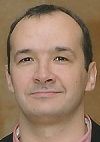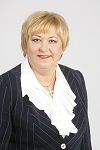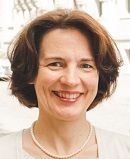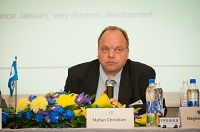-
Malmö (SWEDEN)
-
JSC Tolimojo keleivinio transporto kompanija (LITHUANIA)
-
Zagreb bus station (CROATIA)
-
Tallin bus station (ESTONIA)
-
Riga inrenational coach terminal (LATVIA)
-
Daugavpils coach terminal (LATVIA)
-
Belgrad bus station (SERBIA)
-
ZOB Hamburg (GERMANY)
-
Ljubljana International Coach terminal (SLOVENIA)
-
Kaunas bus station (LITHUANIA)
-
Joint Stock Company Nordeka (LATVIA)
WORKSHOP SPEAKERS

Ingmar Roos
Current work and experience: Managing Director of T grupp AS.
T grupp AS along with its subsidiary Cargobus OÜ is operating 10 of the Estonian biggest bus terminals. T grupp AS is also running cross operator integrated ticket sales and information platform „Tpilet“ which is used for ticket sales in all Estonian bus terminals. The company’s viewport is that ticketing system should be accessible and set no restrictions to bus operators to conduct ticket sales whichever sales channel they and their clients prefer.
Former work: 2008-2015 Head of Public Transport department of Estonian Road Administration
Education: Logistics (MSc), Business Information Technology (BSc), Logistics (BSc)
Presentation theme: What passenger REALLY wants? Results of long distance bus transport’s survey
Abstract:
In December 2017 T grupp AS with its partner TNS Emor conducted a nationwide survey which object to understand which characteristics and add-on services define the quality of long distance coach services in the view of passenger. The survey also identified that the overall popularity of long distance coach services which is operated on commercial basis is higher and associated with better imago than public transport services which are operated under public service contracts. The cause of such tendency is likely to be due to fact that bus companies operating on commercial basis are motivated to continuously develop their services in order to meet and exceed the expectations of their passengers.

Burkhard Eberwein, Dipl.-Ing.
Current work and experience:
- Head of department “Vehicle Management Bus” at the Berlin public transport company “Berliner Verkehrsbetriebe” (BVG)
- Responsible for the implementation and testing of new technologies in buses and new concepts and strategies for operation
- Management of EU and nationally funded projects in the field of innovative vehicle technologies
- VDV (Association of German Public Transport Companies) and UITP (International Association of Public Transport) member
- To be retired since 01.03.13, until 31.01.17 technical consultant for BVG bus department
- Technical consultant e-mobility
Presentation theme: Bus technologies for Emission Reduction
Abstract:
All large cities are challenged with vehicular emissions. The reduction of emissions is a main objective in the field of environmental protection. From an economic point of view different modern technologies are available to reach this goal. As a first step an efficiency enhancement program for the older buses could be started. The SCRT-system will attain the required exhaust-gas temperature to meet the EURO VI emissions standards under the conditions of rather slow moving traffic. Further concepts based on ICE are Plug-In-Hybrid, CNG or Hydrogen. For a zero-emission public transport the use of electrical mobility is necessary. Available technologies like Hybrid/Fuel Cell, E-Bus with -overnight , -opportunity charging or battery swapping are integrated into the workshop operations.

Hugo Osula
Current work and experience: Mootor Grupp, Lux Express Grupp, Chairman of the Board.
25 years of experience in mobility sector, managing one of the leading bus service and infrastructure providers in Baltic region called Mootor Grupp AS.
Presentation theme: From conventional bus operator to Lux Express
Abstract:
2001 intercity bus traffic was deregulated. For bus companies essential question was how to transform the existing “social service” to demand driven mobility. The main issue was poor and bland image of the bus service, which was constantly suffering from decreasing amount of passengers. In this presentation I explain the steps and approach of how Mootor Group in facing those challenges and ending up with Lux Express.

Eng. Raitis Mazjānis
Current work and experience: Deputy of Technical director «Rīgas satiksme», FISITA council member LAIA President (Latvian Asociation of Automotive Engineers)
Presentation theme: Fuel Cell Electric Buses – Potential Public Transport in Riga

Nemanja Mučibabić
Current work and experience: Director of Traffic and Tourism Department at BAS – Beogradska autobuska stanica a.d.
Presentation theme: New coach terminal in Belgrade
Abstract:
Introduction of General city plan, Location, area, Architecture, Category of bus and coach traffic planned to be served – regular (suburban, intercity, international) and irregular (touristic), Concept (scheme) of design of coach terminal, Capacity of bus and coach area (arrival and departure platforms, parking lot), Capacity of passenger’s building.

Juris Droiskis
Current work and experience: MBA, Project manager, JSC “Nordeka”.
Presentation theme: “Nordeka” infotainment system.
Abstract:
Concise overview of information display usage in Nordeka regional coaches – ways to inform, educate and entertain passengers while on-board.

Andrejs Maļarenko
Current work and experience: Ltd. “LDZ apsardze” Security department, Technical project manager
1992 -1995 Riga Civil Aviation Institute, radio engineer
1992 – 1996 Riga Aviation University, Economist diploma
Presentation theme: “Safety and Security issues for passenger terminals”
Abstract (presentation highlights):
Passenger safety – challenges for security service; Common solutions; Innovations in Transportation infrastructure technical security.

Dr.sc.ing. Irina Yatskiv
Current work and experience: Professor and Vice-rector for Research and Development Affairs at the Transport and Telecommunication Institute in Riga (Latvia), Member of ECTRI Board www.ectri.org, Alliance Project Coordinator www.alliance-project.eu
Prof. Irina Yatskiv (Jackiva) is a leading expert in transport modelling and data analysis. She has experience in developing and implementation of master study programs, TTI Vice-rector for research and development affairs. She has great experience in coordinating different kind of projects in frame of FP, INTERREG, BSR programmes. Irina has participated in more than 20 European and Latvian research projects and more than 10 national transportation studies, and was scientific coordinator in more than 5 of them. She presented Latvia in management committee in COST Actions Transport and Urban Development, TU1306; TU1004, TU0903; TU0804; TU0801. Now, she is the Coordinator of Horizon 2020 project “Enhancing excellence and innovation capacity in sustainable transport interchanges” (ALLIANCE). Prof. Irina Yatskiv is from January 2017 Member of ECTRI Board, an external scientific expert in Association of Paneuropa Coach Terminals from 2009. She has been chair or member of the organizing committee and the programme committee of the International Conference on Applied Statistics (4 events), Transportation Research (15 events), Complex Systems (3 events), etc. and reviewer in transportation journals and conference proceedings.
She is Guest redactor of Lecture Notes in Networks and Systems, Volume 36 (2108), Springer; Procedia Engineering, Volume 187 (2017), 134 (2016) published by Elsevier and others.
Authors more than 130 publications, including 9 books and textbooks, as well as 108 scientific papers, including chapters in the books “From Transit Systems to Models: Purpose of Modelling”. In book: Modelling Public Transport Passenger Flows in the Era of Intelligent Transport Systems” (Springer Verlag, 2016), “3D City Models and urban information: Current issues and perspectives” (edpsciences, 2014), papers in International Journal of Transport, Transport and Telecommunication, Advances in Intelligent Systems and Computing, etc. Promoted 5 Doctoral and more than 50 Master theses.
Presentation theme: Possible effects of connected and automated driving on the economy, employment and skills
Abstract:
- Connected and Autonomous Vehicles (CAVs): The Enabling Technologies
- Overview • Definitions • Levels of Autonomy
- 2 development scenarios: on the Rise and tamed by Policy and Peoples
- Why Safety is an Important Socio-Economic impact Issue for CAVs
- Changing Travel Patterns and Technologies
- Travel behavior impacts of CAVs
- Improved mobility, new innovative mobility services
- Automation Advancing into Transit Bus Operations
- How to ensure equitable access to CAVs
- Learning from Experience Abroad

Raluca Marian
Current work and experience: Senior adviser – passenger transport of IRU’s Permanent Delegation to the European Union where she leads on advocacy and legal matters related to passenger transport on roads.
Prior to joining IRU, for over 10 years Raluca was a competition and regulatory lawyer in Norton Rose Fulbright’s team in Brussels, where she advised on a broad range of competition areas, such as merger control, investigations, abuse of dominance, horizontal and vertical agreements and State aid law. On the regulatory side, her focus has been transport regulation, export control and market access.
Raluca holds a postgraduate diploma in Economics for Competition Law from King’s College London and an LL.M. degree in International Legal Cooperation from the Free University of Brussels.
Presentation theme: IRU in Passenger Transport Innovation
Abstract (presentation highlights):
IRU Member Associations; Current Trends in Passenger Transport; IRU Projects Research and Innovation

Vaira Gromule
Current work and experience:
2000 – till now Chairman of the Board JSC “Rīgas starptautiskā autoosta”
2014 – till now Member of the Council Road transportation association “Latvijas Auto”
2004 – till now General secretary “Association of Paneuropean Coach Terminals”
2011 – Engineering Doctor degree of Transport and Communication science in field of Telematics and Logistics (Dr.sc.ing.)
Presentation theme: Main achievements and challenges of the Association during the 15 years period. Report by general secretary

MSc Kristine Malnaca
Current work and experience: Researcher, JSC “Ferrus”, project “Development of economically justified technology of conversion of the traditional diesel city bus into the environmentally friendly electrobus” funded from the ERDF.
Professional experience in transportation for 20 years. Primary areas of expertise include transport infrastructure system analysis, transport planning, transportation economics and risk analysis.
Presentation theme: Economic Viability of Converted Diesel City Bus Into Electric Bus
Abstract:
Cities are crucial for the delivery of low emission mobility, and electrification of buses is a step towards reducing the fossil fuel dependency of the transportation sector as well as creation of a healthier urban environment. At the same time electric buses are still a challenge for public transport operators due to high acquisition costs of a new vehicle and lack of charging infrastructure. Therefore conversion of diesel city bus into electric bus is one of the alternatives considered. Economic viability of converted diesel bus into electric bus can be assessed using an economic model that allows to compare the total cost of ownership of such bus with a diesel bus. A specific case of operating converted diesel bus into electric bus in a city of Latvia is analyzed.

Stefan Christian
Current work and experience:
Berlin public transport company “Berliner Verkehrsbetriebe” (BVG), Project manager, Vocational trainings cente
President – Association of Paneuropean Coach Terminals since 2008
2006 – 2009 Director Central Coach Station Berlin
2009 – 2015– Project manager for different HR-, Technologies- and Strategic projects at Berliner Verkehrsbetriebe
2015 – Project manager for re-organization of vocational training at Berliner Verkehrsbetriebe










